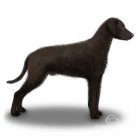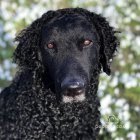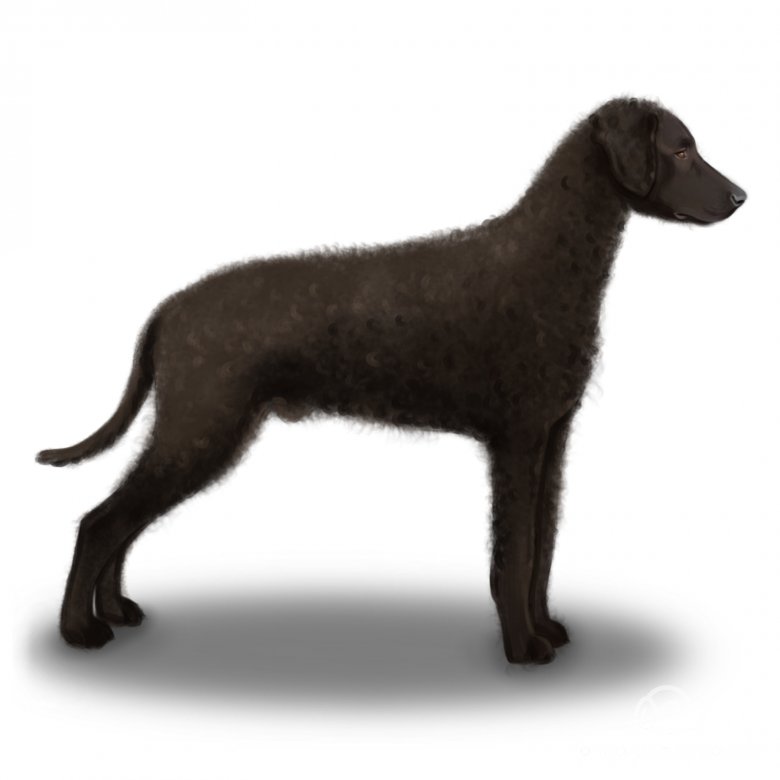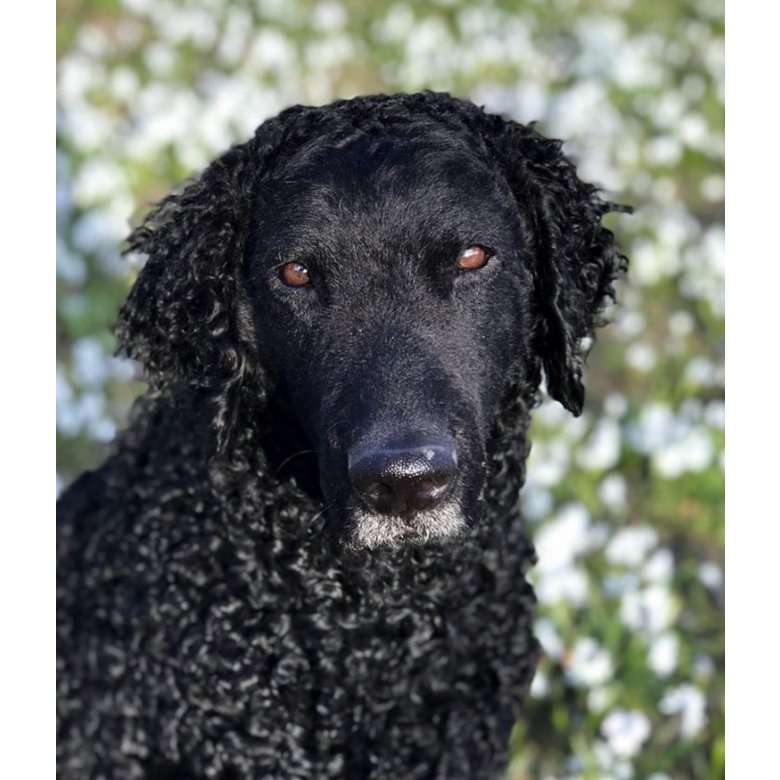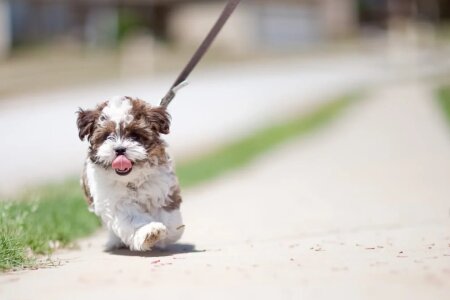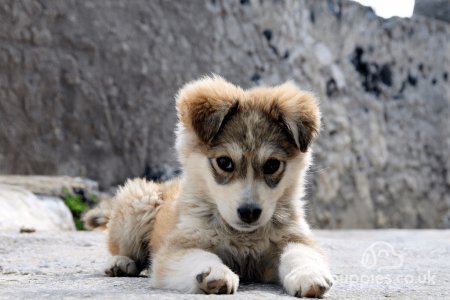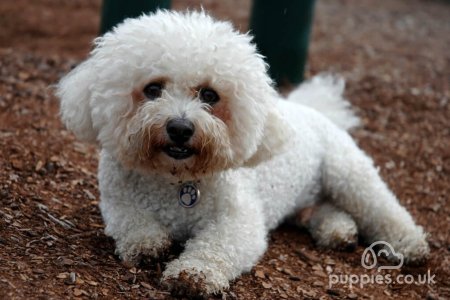Why Curly Coated Retrievers are great
Curly Coated Retrievers, a breed that is commonly known as the Curly, Curly Coat or CCR, are known for being extremely affectionate companion dogs that fit perfectly into families with children of all ages. They tend to be playful and mischievous, struggling to manage their boredom, whilst also being standoffish and watchful of strangers. Some highlights:
Curly Coated Retrievers are fantastic family companions, remaining loyal and devoted throughout their lives
This breed is extremely clever, making them easily trainable and easy to control
Their short and dense coat means that the Curly Coated Retriever does not need a lot of grooming
CCRs are known for being extremely good natural watchdogs, alerting their owners by barking at an unusual or unfamiliar sight or sound.
Things to consider when looking at Curly Coated Retrievers for Sale
It is important to note that although a positive of the Curly Coated Retriever is that they are a smart breed, this intelligence can cause them to be stubborn and independent. They know what they are being asked of, but they will decide whether they want to do it or not. An owner of this breed should be prepared to be gentle yet firm at setting rules and teaching obedience and respect. Some downsides to the Curly Coated Retriever:
The Curly Coated Retriever has a very low boredom tolerance, requiring regular mental and physical stimulation
Early socialisation is key for this breed with both people, sights, sounds, and other animals, as otherwise, they may grow up to be wary and nervous around unfamiliar objects.
This breed does shed. The males usually shed only once a year whereas the females shed twice a year.
Curly Coated Retrievers prey drive is naturally high, and they may see small animals such as rabbits as prey to hunt and chase.
History of Curly Coated Retrievers
Although their true ancestry is unknown, records show that the Curly Coated Retriever was one of the first retrieving breeds used in England, with evidence dating back in the UK to the 1860s. Curlies grew drastically in popularity, being one of the most popular breeds in the mid-1900s. It was thought that there are other breeds that were used to develop the CCR, including the Large Rough Water Dog, Tweed Water Spaniel Terrier, the Poodle and the Wetterhound. Although this breed was very popular, World War 1 made the numbers fall dramatically. Interestingly, the introduction of the Labrador impacted numbers as well, but was then saved by breeders establishing programs during the mid-1930s. The Curly Coated Retriever is a very versatile dog, even today being seen as a very sought-after breed with well-bred puppies commanding a lot of money.
Appearance
How big is the Curly Coated Retriever?
Typically, the Curly Coated Retriever males grow to about 64-69cm, whilst the females grow to 58-64cm
How heavy is a Curly Coated Retriever?
With their large size, the Curly Coated Retriever is a heavy breed. Males usually grow to weight about 32-41kg, and the females about 23-32kg.
What Colour is the Curly Coated Retriever?
One of the most striking factors about the CCR is their coat. Their small, unique, crisp tight curls allow them to be waterproof and thorn-proof, making them the perfect hunting and shooting companion in all weathers, climates and terrains. This breed comes in two colours: Dark Brown (Liver), or Black.
Temperament
Do Curly Coated Retrievers make good guard dogs?
The Curly Coated Retriever tends to make a very good natural watchdog but will not make the best guard dog. Although they will bark and alert their owners of something unfamiliar, they will not approach the situation at all or be aggressive, preferring to stand and bark instead of reacting.
Do Curly Coated Retrievers bark a lot?
The CCR will only bark when it is viewed as being necessary. Occasionally, puppies of this breed do bark to express themselves, but this can be caught and removed early through training.
Are Curly Coated Retrievers easy to train?
Due to their intelligence, this breed is very easy to train. However, they need a stern but gentle owner that will make them realise that they are not the boss and to be patient with the stubbornness. If this behaviour is not treated early on in the relationship with the puppy, there can be problems with obedience and respect later on in their lives.
Are Curly Coated Retrievers playful?
The Curly Coated Retriever is a very playful and energetic breed with a good sense of humour. They enjoy playing games and they do well at many canine sports, especially obedience and agility.
Are Curly Coated Retrievers good with children?
This breed is very good with children of all ages, loving to play with them as well as protect them.
Can I leave a Curly Coated Retriever Alone?
Although this breed does not suffer from separation anxiety, they do not enjoy being left alone for long periods of time. If they are left, they can turn to destructive activities to relieve their stress and boredom, such as chewing or digging.
Do Curly Coated Retrievers like water?
A big part of the Curly’s enjoyment outside surrounds playing in water. They adore swimming and will happily jump in to retrieve game whilst working in the field, their coats protecting them from the cold water. This makes them the ideal field companion.
Health
How long do Curly Coated Retrievers live?
This breed commonly lives between 8-13 years, depending on health.
How much exercise does a Curly Coated Retriever need?
The Curly Coated Retriever requires a high amount of exercise, doing anything from playing in the garden to going on long walks or runs with their owner. They are not well suited to apartments, needing a large outdoor space that will allow them to entertain themselves and stop them from getting bored.
What are Curly Coated Retrievers Common health issues?
Although this breed is very energetic and able to do a variety of activities, they are prone to a number of health issues:
Hip and Elbow Dysplasia
Eye Diseases
Bloating
Renal Failure
Epilepsy
Allergies
Hair Loss
Weight Gain
Care
How much space do I need for a Curly Coated Retriever?
As Curly Coated Retrievers are big dogs, they need enough space to feel comfortable inside. Although they can withstand harsh climates, they should not live outside and are happiest when they are seen as part of the family. They do not do well in apartments and need access to a large area where they can entertain themselves.
How much grooming do Curly Coated Retrievers need?
Due to their thick and dense coats, the Curly Coated Retriever needs minimal grooming. However, they do shed once or twice a year and are not hypoallergenic, which can cause problems for some people.
Average costs
How much does it cost to keep a Curly Coated Retriever?
As a rough guide in pricing: Cost to buy: roughly £500-£800 for a well-bred Curly Coated Retriever puppy Other costs (Vet, Food etc): £80-£110 per month
Specific Buying Guide
You can read our general buying guide here (/advice-on-buying-a-puppy/), with the most important thing being going to view your Curly Coated Retriever Puppy, seeing it with its mother, and checking the quality of the breeder. More specifically, here is some Curly Coated Retriever puppy buying advice:
The CCR is a late developer, only maturing fully around 3 years-old meaning they are puppy-like up until this point. However, if good socialisation and training is implemented early on, these dogs quickly become perfect companions around the house and in the field.
This breed is not the best choice for first time dog owners as they need a strong hand to put them in line sufficiently and stop them from trying to lead the family.
Curly Coated Retrievers are a vulnerable breed, with not many puppies registered every year. Therefore, potential buyers should expect waiting lists and should be prepared for not being successful in getting a puppy instantly. With this being said, scams can regularly be seen in this breed. These can be spotted by their listing price, which is usually a lot lower. Be very careful when looking at puppies online, and never agree to send in payment to a breeder without seeing the litter yourself.
Other reading, Adopting Curly Coated Retriever Puppies and Rescue Organisations
https://www.curlycoatedretrieverclub.co.uk/rescue/ https://www.thekennelclub.org.uk/services/public/findarescue/Default.aspx?breed=2045 https://www.akc.org/dog-breeds/curly-coated-retriever/






